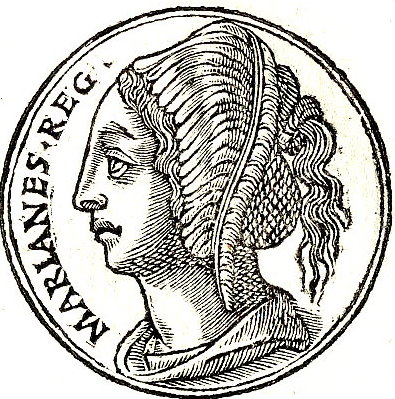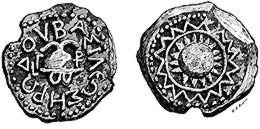|
Gaius Plancius Varus
Gaius Plancius Varus was a Roman who lived between the 1st century and 2nd century in the Roman Empire. Varus was the son of the Roman Senator and Proconsul Marcus Plancius Varus, and the Herodian Princess Julia. His sister was Plancia Magna; he was therefore the maternal uncle to Gaius Julius Plancius Varus Cornutus. Varus was born and raised in Perga, the capital of the Roman province of Pamphylia. His maternal grandparents were King Tigranes VI of Armenia and his wife Opgalli, while his maternal uncle was prince Gaius Julius Alexander. Varus was of Roman, Jewish, Nabataean, Edomite, Greek, Armenian and Persian ancestry. Varus’ maternal ancestors were King Archelaus of Cappadocia, King of Judea Herod the Great, and his wife Mariamne. Varus along with his maternal cousins were among the last known descendants of the Herodian Dynasty. He appeared to be an apostate to Judaism. It is unlikely that Varus attempted to exert influence on Judean politics. Varus served as a Roman Sen ... [...More Info...] [...Related Items...] OR: [Wikipedia] [Google] [Baidu] |
Ancient Rome
In modern historiography, ancient Rome refers to Roman civilisation from the founding of the city of Rome in the 8th century BC to the collapse of the Western Roman Empire in the 5th century AD. It encompasses the Roman Kingdom (753–509 BC), Roman Republic (509–27 BC) and Roman Empire (27 BC–476 AD) until the fall of the western empire. Ancient Rome began as an Italic settlement, traditionally dated to 753 BC, beside the River Tiber in the Italian Peninsula. The settlement grew into the city and polity of Rome, and came to control its neighbours through a combination of treaties and military strength. It eventually dominated the Italian Peninsula, assimilated the Greek culture of southern Italy ( Magna Grecia) and the Etruscan culture and acquired an Empire that took in much of Europe and the lands and peoples surrounding the Mediterranean Sea. It was among the largest empires in the ancient world, with an estimated 50 to 90 million inhabitants, roughly 20% of t ... [...More Info...] [...Related Items...] OR: [Wikipedia] [Google] [Baidu] |
Greeks
The Greeks or Hellenes (; el, Έλληνες, ''Éllines'' ) are an ethnic group and nation indigenous to the Eastern Mediterranean and the Black Sea regions, namely Greece, Cyprus, Albania, Italy, Turkey, Egypt, and, to a lesser extent, other countries surrounding the Mediterranean Sea. They also form a significant diaspora (), with Greek communities established around the world.. Greek colonies and communities have been historically established on the shores of the Mediterranean Sea and Black Sea, but the Greek people themselves have always been centered on the Aegean and Ionian seas, where the Greek language has been spoken since the Bronze Age.. Until the early 20th century, Greeks were distributed between the Greek peninsula, the western coast of Asia Minor, the Black Sea coast, Cappadocia in central Anatolia, Egypt, the Balkans, Cyprus, and Constantinople. Many of these regions coincided to a large extent with the borders of the Byzantine Empire of the late 11th cent ... [...More Info...] [...Related Items...] OR: [Wikipedia] [Google] [Baidu] |
1st-century Romans
The 1st century was the century spanning AD 1 ( I) through AD 100 ( C) according to the Julian calendar. It is often written as the or to distinguish it from the 1st century BC (or BCE) which preceded it. The 1st century is considered part of the Classical era, epoch, or historical period. The 1st century also saw the appearance of Christianity. During this period, Europe, North Africa and the Near East fell under increasing domination by the Roman Empire, which continued expanding, most notably conquering Britain under the emperor Claudius (AD 43). The reforms introduced by Augustus during his long reign stabilized the empire after the turmoil of the previous century's civil wars. Later in the century the Julio-Claudian dynasty, which had been founded by Augustus, came to an end with the suicide of Nero in AD 68. There followed the famous Year of Four Emperors, a brief period of civil war and instability, which was finally brought to an end by Vespasian, ninth Roman emperor, ... [...More Info...] [...Related Items...] OR: [Wikipedia] [Google] [Baidu] |
Imperial Roman Consuls
Imperial is that which relates to an empire, emperor, or imperialism. Imperial or The Imperial may also refer to: Places United States * Imperial, California * Imperial, Missouri * Imperial, Nebraska * Imperial, Pennsylvania * Imperial, Texas * Imperial, West Virginia * Imperial, Virginia * Imperial County, California * Imperial Valley, California * Imperial Beach, California Elsewhere * Imperial (Madrid), an administrative neighborhood in Spain * Imperial, Saskatchewan, a town in Canada Buildings * Imperial Apartments, a building in Brooklyn, New York * Imperial City, Huế, a palace in Huế, Vietnam * Imperial Palace (other) * Imperial Towers, a group of lighthouses on Lake Huron, Canada * The Imperial (Mumbai), a skyscraper apartment complex in India Animals and plants * ''Cheritra'' or imperial, a genus of butterfly Architecture, design, and fashion * Imperial, a luggage case for the top of a coach * Imperial, the top, roof or second-storey compartment of a c ... [...More Info...] [...Related Items...] OR: [Wikipedia] [Google] [Baidu] |
Senators Of The Roman Empire
A Senator is a member of a senate, such as the United States Senate. Senator or Senators may also refer to: People *Senator (bishop of Milan) (died 475), also known as Senator of Settala *Senator (consul 436), a politician of the Eastern Roman Empire *Henry of Castile the Senator (1230–1303), Castilian infante; the fourth son of Ferdinand III of Castile by Beatrice of Swabia *"The Senator", nickname for American jazz bassist Eugene Wright, member of The Dave Brubeck Quartet *Hermann Senator (1834–1911), German internist physician * Ronald Senator (1926–2015), British composer Sport teams *Ottawa Senators, a Canadian hockey team * Washington Senators (1961-1971), a U.S. baseball team in the American League, now the Texas Rangers * Washington Senators (1901–1905 and 1956–1960), a U.S. baseball team in the American League, based in Washington from 1901 to 1960 though officially named the Nationals during 1905–1955, now the Minnesota Twins *Washington Senators (1891-1899) ... [...More Info...] [...Related Items...] OR: [Wikipedia] [Google] [Baidu] |
Hadrian
Hadrian (; la, Caesar Trâiānus Hadriānus ; 24 January 76 – 10 July 138) was Roman emperor from 117 to 138. He was born in Italica (close to modern Santiponce in Spain), a Roman ''municipium'' founded by Italic settlers in Hispania Baetica and he came from a branch of the gens Aelia that originated in the Picenean town of Hadria, the ''Aeli Hadriani''. His father was of senatorial rank and was a first cousin of Emperor Trajan. Hadrian married Trajan's grand-niece Vibia Sabina early in his career before Trajan became emperor and possibly at the behest of Trajan's wife Pompeia Plotina. Plotina and Trajan's close friend and adviser Lucius Licinius Sura were well disposed towards Hadrian. When Trajan died, his widow claimed that he had nominated Hadrian as emperor immediately before his death. Rome's military and Senate approved Hadrian's succession, but four leading senators were unlawfully put to death soon after. They had opposed Hadrian or seemed to threaten his s ... [...More Info...] [...Related Items...] OR: [Wikipedia] [Google] [Baidu] |
Judaism
Judaism ( he, ''Yahăḏūṯ'') is an Abrahamic, monotheistic, and ethnic religion comprising the collective religious, cultural, and legal tradition and civilization of the Jewish people. It has its roots as an organized religion in the Middle East during the Bronze Age. Modern Judaism evolved from Yahwism, the religion of ancient Israel and Judah, by the late 6th century BCE, and is thus considered to be one of the oldest monotheistic religions. Judaism is considered by religious Jews to be the expression of the covenant that God established with the Israelites, their ancestors. It encompasses a wide body of texts, practices, theological positions, and forms of organization. The Torah, as it is commonly understood by Jews, is part of the larger text known as the ''Tanakh''. The ''Tanakh'' is also known to secular scholars of religion as the Hebrew Bible, and to Christians as the " Old Testament". The Torah's supplemental oral tradition is represented by later texts s ... [...More Info...] [...Related Items...] OR: [Wikipedia] [Google] [Baidu] |
Apostasy
Apostasy (; grc-gre, ἀποστασία , 'a defection or revolt') is the formal disaffiliation from, abandonment of, or renunciation of a religion by a person. It can also be defined within the broader context of embracing an opinion that is contrary to one's previous religious beliefs. One who undertakes apostasy is known as an apostate. Undertaking apostasy is called apostatizing (or apostasizing – also spelled apostacizing). The term ''apostasy'' is used by sociologists to mean the renunciation ''and'' criticism of, or opposition to, a person's former religion, in a technical sense, with no pejorative connotation. Occasionally, the term is also used metaphorically to refer to the renunciation of a non-religious belief or cause, such as a political party, social movement, or sports team. Apostasy is generally not a self-definition: few former believers call themselves apostates due to the term's negative connotation. Many religious groups and some states punish apostat ... [...More Info...] [...Related Items...] OR: [Wikipedia] [Google] [Baidu] |
Mariamne (second Wife Of Herod)
Mariamne I (died 29 BCE), also called Mariamne the Hasmonean, was a Hasmonean dynasty, Hasmonean princess and the second wife of Herod the Great. She was known for her great beauty, as was her brother Aristobulus III of Judea, Aristobulus III. Herod's fear of his rivals, the Hasmonean dynasty, Hasmoneans, led him to execute all of the prominent members of the family, including Mariamne. Her name is spelled Μαριάμη (Mariame) by Josephus, but in some editions of his work the second ''m'' is doubled (Mariamme). In later copies of those editions the spelling was Dissimilation, dissimilated to its now most common form, Mariamne. In Hebrew language, Hebrew, Mariamne is known as , (Miriam), as in the traditional, Bible, Biblical name (see Miriam, the sister of Moses and Aaron). Life Mariamne was the daughter of the Hasmonean Alexander Maccabeus, Alexandros, also known as Alexander of Judaea, and thus one of the last heirs to the Hasmonean dynasty of Judea. Mariamne's only si ... [...More Info...] [...Related Items...] OR: [Wikipedia] [Google] [Baidu] |
Herod The Great
Herod I (; ; grc-gre, ; c. 72 – 4 or 1 BCE), also known as Herod the Great, was a Roman Jewish client king of Judea, referred to as the Herodian kingdom. He is known for his colossal building projects throughout Judea, including his renovation of the Second Temple in Jerusalem and the expansion of the Temple Mount towards its north, the enclosure around the Cave of the Patriarchs in Hebron, the construction of the port at Caesarea Maritima, the fortress at Masada, and Herodium. Vital details of his life are recorded in the works of the 1st century CE Roman–Jewish historian Josephus. Herod also appears in the Christian Gospel of Matthew as the ruler of Judea who orders the Massacre of the Innocents at the time of the birth of Jesus, although most Herod biographers do not believe that this event occurred. Despite his successes, including singlehandedly forging a new aristocracy from practically nothing, he has still been criticised by various historians. His reign pola ... [...More Info...] [...Related Items...] OR: [Wikipedia] [Google] [Baidu] |






